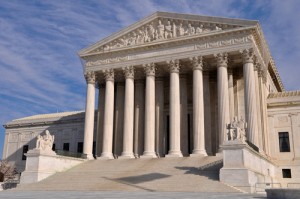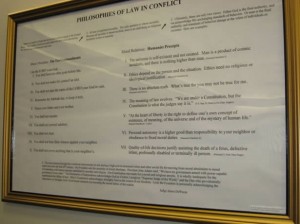I want to bring you an update on our efforts to get the U.S. Supreme Court to hear a case involving the display of the Ten Commandments, a case I told you about in June. We filed our Petition for Writ of Certiorari at the high court a couple of months ago. Now, we have filed a reply brief arguing that the ACLU has no legal standing to bring a challenge against an Ohio courtroom display containing the Ten Commandments.
An appeals court declared unconstitutional a poster displayed by Judge James DeWeese that included the Ten Commandments as part of an exhibit on legal philosophy. In our reply brief filed with the Supreme Court, we contend that the appeals court erred in its decision and urged the high court to take the case.
We represent Judge DeWeese.
At issue is a poster designed to illustrate the clash between different views of law and morality. The “Philosophies of Law in Conflict” poster features two columns of principles or precepts intended to show the contrast between legal philosophies based on moral absolutes and moral relativism. The judge used a version of the Ten Commandments as symbolic of moral absolutes, and a set of statements from sources such as the Humanist Manifesto as symbolic of moral relativism.
In our reply brief filed today, we assert that the ACLU lacks legal standing to bring the challenge, citing Supreme Court precedent that shows the mere observation of an unwelcome governmental display of religion does not give one legal standing to challenge the display in federal court. We also argue that the federal appeals court was wrong in holding that the display was unconstitutional, arguing the poster falls in line with those decisions of the Supreme Court recognizing “the strong role played by religion and religious traditions throughout our Nation’s history.” (Van Orden v. Perry, 2005)
“DeWeese’s poster is an affirmation of what the Founders and their successors saw as a simple and abiding truth; that a recognition of moral absolutes, which receive their permanence from a divine source, are critical in ‘restoring the moral fabric of this nation,'” the brief contends. “To assert that such an affirmation constitutes an impermissible endorsement of religion, as did the court below, is ‘to take a rigid, absolutist view of the Establishment Clause’ this Court has ‘consistently declined’ to adopt.” (Lynch v. Donnelly, 1984)
According to the brief: “DeWeese’s statement that he agrees with the Founders in grounding morality in a divine source is no more an establishment of religion than what this Court itself has recognized regarding the historical and symbiotic role between religion and government.” The reply brief is posted here.
The Supreme Court has a perfect opportunity to make it clear that a governmental affirmation of moral absolutes, symbolized here by the Ten Commandments, does not violate the Constitution.
It’s time for the high court to set the record straight: the display by Judge DeWeese is a constitutionally-permissible method of explaining his legal and moral philosophy, the same philosophy embraced by our founders.
We’re hopeful the Supreme Court takes this case. We’ll find out when the high court reconvenes for its new term in the fall.



